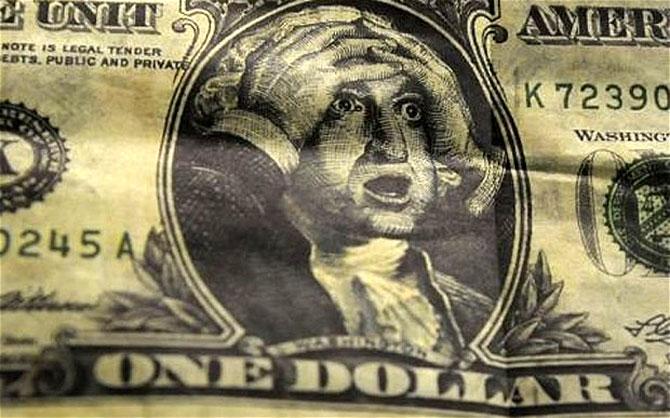Swiss authorities have always maintained that assets held by Indian residents in Switzerland cannot be considered as 'black money' and they actively support India in its fight against tax fraud and evasion.

Funds parked by Indian individuals and enterprises in Swiss banks, including through India-based branches, fell nearly 6 per cent in 2019 to 899 million Swiss francs (Rs 6,625 crore), annual data from Switzerland's central bank showed on Thursday.
This marks the second consecutive year of decline in aggregate funds of Indian clients with all Swiss banks, taking the figure to the third lowest level in more than three decades since 1987 when the Swiss National Bank (SNB) began compiling the data.
The total amount of CHF 899.46 million, described by the SNB as aggregate 'liabilities' of Swiss banks or 'amounts due to' their Indian clients at the end of 2019, included CHF 550 million (over Rs 4,000 crore) of customer deposits; CHF 88 million (Rs 650 crore) held via other banks; 7.4 million (Rs 50 crore) through fiduciaries or trusts; and CHF 254 million (Rs 1,900 crore) as 'other amounts due to customers' in form of securities and various financial instruments.
All the four components declined during 2019.
These are official figures reported by banks to the SNB and do not indicate the quantum of the much-debated alleged black money held by Indians in Switzerland.
These figures also do not include the money that Indians, NRIs or others might have in Swiss banks in names of third-country entities.
According to the SNB, its data for 'total liabilities' of Swiss banks towards Indian clients takes into account all types of funds of Indian customers at Swiss banks, including deposits from individuals, banks and enterprises.
This includes data for branches of Swiss banks in India, as also non-deposit liabilities.
Indian and Swiss authorities have earlier said that a more reliable measure for deposits by Indian individuals in Swiss banks is given by the 'locational banking statistics' of the Bank for International Settlement (BIS), which showed a marginal increase of 0.07 per cent in 2019 to $90.6 million (nearly Rs 646 crore).
This figure takes into account deposits as well as loans of Indian non-bank clients of Swiss-domiciled banks and had shown a decline of 11 per cent in 2018 and of 44 per cent in 2017.
It peaked at over $2.3 billion (over Rs 9,000 crore) at the end of 2007.
Swiss authorities have always maintained that assets held by Indian residents in Switzerland cannot be considered as 'black money' and they actively support India in its fight against tax fraud and evasion.
While an automatic exchange of information in tax matters between Switzerland and India has been in force since 2018.
Under this framework, detailed financial information on all Indian residents having accounts with Swiss financial institutions since 2018 was provided for the first time to Indian tax authorities in September 2019 and this is to be followed every year.
In addition to this, Switzerland has been actively sharing details about accounts of Indians suspected to have indulged in financial wrongdoings after submission of prima facie evidence.
Such exchange of information has taken place in hundreds of cases so far.
According to the SNB data available since 1987, the lowest level of funds held by Indians in Swiss banks was seen in 1995 at CHF 723 million, while the second lowest was in 2016 at CHF 676 million.
The amount had peaked at CHF 6.5 billion in 2006, before declining for five consecutive years.
Since those record levels, there has been a rise only three times -- in 2011 (12 per cent), 2013 (43 per cent) and then in 2017.
Overall, customer deposits in all Swiss banks rose marginally by 0.3 per cent to CHF 1.8 trillion (more than Rs 130 lakh crore).
Of this, domestic customer deposits rose by CHF 25.3 billion to CHF 1.25 trillion, while foreign customer deposits declined by CHF 20.5 billion to CHF 567.6 billion (nearly Rs 42 lakh crore).
Aggregate liabilities of Swiss banks, including amount due to customers and banks and through holding of various securities, rose by 2.9 per cent to CHF 3.3 trillion (over Rs 240 lakh crore).
This included CHF 1.3 trillion (nearly Rs 95 lakh crore) towards their foreign clients, which rose by nearly 2 per cent.
The countries for which Swiss banks reported rise in amounts due to clients from there included the US and UK, while the money parked by individuals and enterprises from Pakistan and Bangladesh also declined during 2019.
Just like India, the issue of alleged black money in Swiss banks has been a political hot potato in the two neighbouring countries as well.
While Pakistani money in Swiss banks declined by nearly 45 per cent to CHF 410 million (about Rs 3,000 crore), the figure for Bangladesh fell 2 per cent to CHF 605 million (Rs 4,500 crore).
As per the SNB, there were 246 banks in Switzerland at the end of 2019. Of these, 216 reported profit totalling of CHF 13.1 billion, while the remaining 30 reported losses amounting to CHF 12.3 billion, resulting in aggregate profit of CHF 752 million (Rs 5,500 crore) -- reflecting a huge decline of over 93 per cent from the 2018 levels.
The aggregate balance sheet total for all banks in Switzerland rose by 2.9 per cent to CHF 3.3 trillion.
Customer holdings of securities in bank custody accounts increased by 15.9 per cent to nearly CHF 6.8 trillion, while fiduciary funds administered by banks were also considerably higher in 2019 and closed the year at CHF 197 billion with an increase of over 23 per cent.
The banks saw a pronounced rise of CHF 15.7 billion in fiduciary deposits invested in Swiss francs, increasing that currency's share from 2.5 per cent to 10 per cent.
The headcount of Swiss banks declined by 1,304 to 1,06,084, which the SNB said was mainly attributable to big banks having transferred staff to other group entities not included in the banking statistics.
Photograph: Reuters











 © 2025
© 2025